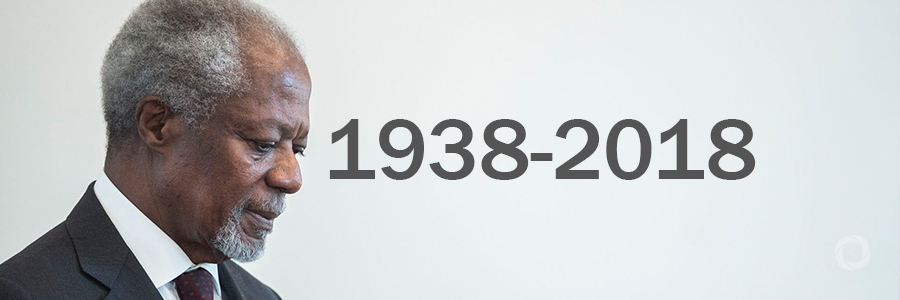A shining light of Africa has passed away. An African at heart, but a global citizen, Kofi Annan symbolized the best of humanity. He was a rabble-rouser, a troubleshooter, and a change-maker.
At the turn of the century, AIDS denialism was at its peak. Mr Annan helped to break it.
“More people have died of AIDS in the past year in Africa than in all the wars on the continent. AIDS is a major crisis for the continent, governments have got to do something. We must end the conspiracy of silence, the shame over this issue,” he said.
When Mr Annan began his term as the new United Nations Secretary-General in 1997, the outlook for the AIDS epidemic was bleak—some 23.3 million people were living with HIV, there were 3.2 million new HIV infections and access to life-saving treatment was only available to a privileged few.
He cajoled world leaders, humbly, diplomatically, and when the message did not sink in he spoke out publicly and forcefully.
“Friends, we know what it takes to turn the tide against this epidemic. It requires every president and prime minister, every parliamentarian, and politician, to decide and declare that ‘AIDS stops with me. AIDS stops with me,’” he said.
Under his leadership, in 2000 the United Nations Security Council adopted resolution 1308, identifying AIDS as a threat to global security. In 2001, the United Nations General Assembly Special Session on HIV/AIDS was held—the first-ever meeting of world leaders on a health issue at the United Nations.
In 2000, at a time when less than US$ 1 billion was being invested in the AIDS response, he called for a war chest of at least US$ 7–10 billion for AIDS, tuberculosis, and malaria. That call, and his concerted lobbying of world leaders, led to the creation of the Global Fund to Fight AIDS, Tuberculosis, and Malaria, which went on to save millions of lives. Mr Annan remained a patron of the Global Fund, helping to ensure that it is fully funded.
The Millennium Development Goal of halting and reversing the spread of AIDS and the 2001 United Nations Declaration of Commitment on HIV/AIDS set HIV prevention targets but did not set concrete targets for access to treatment. At the time, the cost of antiretroviral medicines was astronomically high. Sitting down with the pharmaceutical industry, Mr Annan helped to pave the way for an eventual reduction in their prices. Who could have believed in 2001 that the cost of life-saving antiretroviral medicines would fall by 2018 to as low as US$ 60 per person per year. Today, some 21 million people are on HIV treatment.
Mr Annan deftly used his convening power for good. When he learned that less than 30% of people had knowledge of HIV, he brought together media leaders and helped to launch the Global Media AIDS Initiative. As a result, hundreds of hours of AIDS awareness programmes were run pro bono by public and private media companies around the world. Mr Annan even appeared with an HIV-positive Sesame Street character, helping to reduce stigma and discrimination against children affected by HIV.
His heart was with people affected by HIV. He saw first-hand the realities of the HIV epidemic. He knew that real change came when women and girls were empowered.
“It requires real, positive change that will give more power and confidence to women and girls and transform relations between women and men at all levels of society,” he said. “It requires greater resources for women, better laws for women and more seats for women at the decision-making table. It requires all of you to make the fight against AIDS your personal priority not only this session, or this year, or next year, but every year until the epidemic is reversed.”
He embraced diversity. He was vocal about the rights of sex workers, gay men and other men who have sex with men, people who use drugs and transgender people.
“We need to be able to protect the most vulnerable, and if we are here to try and end the epidemic and fight the epidemic, we will not succeed by putting our head in the sand and pretending that these people do not exist or that they do not need help,” he said. “We need to help them and we need to resist any attempt to prevent us from recognizing the need for action and assistance to these people.”
Mr Annan had a special place in his heart for UNAIDS. He made time for us, kept informed about the progress made in the AIDS response and donated the royalties from a book of his speeches, We the peoples: a UN for the twenty-first century, to UNAIDS. Four weeks ago, when I met with him for lunch, he expressed happiness over how far we had come but was equally concerned that the response was not keeping pace with the ambition we had set.
Two decades ago, he characterized the impact of AIDS as the single greatest reversal in the history of human development, the greatest challenge of our generation. I recall his words as he accepted the UNAIDS Leadership Award in 2016.
“Today, we see tremendous progress, but the fight is not over. We must continue the struggle and wake up each morning ready to fight and fight again, until we win.”
At UNAIDS, we promise that we will not rest until the AIDS epidemic has ended. We owe it to him.
Original source: UNAIDS
Published on 20 August 2018

